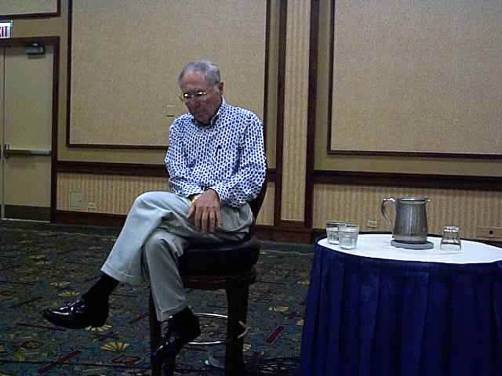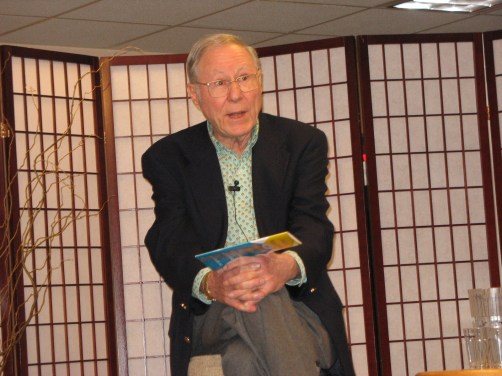It was six years ago today that William Glasser passed away. (b. May 11, 1925 – d. August 23, 2013) For all who knew him it was a deep loss that we experienced at a heart level. His ideas impacted us in such tangible and meaningful ways and we wondered if we had thanked him enough and acknowledged the influence he had, and continues to have, in our lives. As part of my reflection today, which for me has included a few tears and many more smiles, I looked back on some of our almost 50 interviews together. I share this excerpt with you, not because of it’s earthshaking significance, but instead because of it’s joy-sparking simplicity.

Bill Glasser, a chair, a glass of water, and a microphone
An excerpt of interview #4 on November 28, 2003
Roy: Ok, you were back in . . .
Glasser: I was in Akron.
Roy: Akron, yeh. How did that go?
Glasser: It went very well. That was the University of Akron, it was a really good talk. I’m really honing my talk on mental health. And, actually I’m now planning, we’re trying to set it up for the 18thof January, which is a Sunday, I’m trying to, uh, we’re gonna record some very fancy DVD recordings and bring all my work up to date with the new book Warning and everything. And so, you’ll get those tapes, you’ll have that [stuff, too].
Roy: Ok. Seeing you there with the microphone (for this session I had him holding a hand-held microphone) is such a, uh . . .
Glasser: A common way to see me?
Roy: A common, yeh, a very common way to see you, and actually, I’d like to maybe ask you, I was actually thinking about this on the way down today, uh, I’ve seen you speak a number of times. In fact, it would be hard for me to count how many times. I’ve actually arranged a few of those and prior to one of your talks that I arranged, uh, I don’t know if it was you or Linda Harshman, uh, just pointed out to me that all you needed was basically a comfortable chair, a small table with a glass of water on it, and a microphone and you were ready to go.
Glasser: Right. Still am.
Roy: Still am.
Glasser: I never use overhead projectors or things like that because that to me doesn’t work. The audience doesn’t, it just doesn’t work. They’re reading an overhead or . . . To me it’s foolish, Powerpoint and all that stuff. For me it doesn’t work.
Roy: Now you, you have, uh, I’ve seen you give talks that pretty much last the whole day, other than the break for lunch . . .
Glasser: Yeh, I have lots of material.
Roy: I’ve seen you given talks that last, oh, approximately an hour and a half. I’ve seen you give talks to maybe, you know, small groups of thirty people, and I’ve seen you give talks to a group exceeding five thousand people and every, every time it’s the same for you as far as your, uh, microphone, a glass of water, no notes.
Glasser: I never use notes.
Roy: I just have to, when you, when you, ok, like the one I saw where you spoke to over 5,000 people, I mean a gigantic auditorium . . .
Glasser: People even I didn’t see, they were recording . . .
Roy: No, you were on closed-circuit television. Uh, I mean, prior to the talk, do you, do you have things clear in your mind or do you kind of feel like I know this stuff well enough that I’ll go up and start talking and see how it goes?
Glasser: I know the stuff well enough, but I usually figure out how to start. I have the first couple of sentences in my mind to get it started. And then after that, sometimes I’m surprised what happens after that, because I believe that if I have the talk too rehearsed then I lose all the creativity that’s available to me in this subject, so I figured this out a long time ago, so I just start talking and I, it works. And, I’m not nervous before a talk.
Roy: Yeh, I was wondering about that, too.
Glasser: It’s just the opposite. I’m anxious to go. I can’t wait til the introduction is over, you know. (laughter) And you know, I like the Johnny Carson introduction where somebody says, “Here’s Bill,” and that’s good enough for me, and uh, because I’m so, I’m not being . . . I’m not bragging or anything, I’m just so bursting with information I want to share that I, that I, you know, when people like something I’m gonna do, they want me to do it in an hour and I suggest that it won’t cost you any more money if you give me maybe an hour and a half to start, and then, so something I was asked to do recently, we tried to schedule something . . .
Roy: How . . .
Glasser: People that hire speakers they, they think that no one is going to sit for an hour, you know (laughter), but my audiences sit there for longer.
Roy: That’s true. How much after a talk, how much do you self-evaluate or how much do you critique yourself after a talk?
Glasser: No, I don’t really do that. I just say it was a good talk. Sometimes I remember that I forgot to say something I wanted to say, but the audience will never know and I don’t worry about it. If anything, I give the audience more information than they really can deal with easily, so I don’t worry about leaving something out. But talking is what I do. Writing is not . . . I love to write now . . . writing, though, has been learned. But talking, I started talking in 1958, when I started lecturing for the California Youth Authority, I started working there in 57, and, 56 actually. I started working at the Ventura School, and then the lectures were so interesting that Miss Perry said, you know, to other superintendents when they met me, you ought to have Dr. Glasser, so I talked all around the Youth Authority, and then, I started talking to educators also, after I published the book, Mental Health or Mental Illness.
===================
Indeed he did start talking to educators, and what an impact he had and continues to have in that field especially. So many of the current trends – social/emotional learning, mastery learning, focusing on relevance, restorative justice, and the importance of positive relationships – can be traced back to him.
Reading this short excerpt reminds me of his energy and the commitment he had to his beliefs. He was a relentless force, a gentle force, but a force in every sense of the word. Discouragement did not derail him and doubt did not slow him. Ultimately, the excerpt reminds me to buck up and be like Bill! On this important day, may you be invited and inspired and persuaded to buck up, too. The ideas of Choice Theory and Reality Therapy are as effective as ever.

Glasser during a talk in Ventura, CA.
Thank you for sharing this. I’m thankful for his passion to share what he knew, it has changed everything for me.
I remember how quickly you took to the Choice Theory ideas and your almost immediate level of commitment. As with you, Glasser’s way of seeing things and describing things struck a chord with me.
Jim, I cannot thank you enough for posting this; it seemed that Bill was just walking up to the stage and beginning again. I loved every word of this. Thank you from the bottom of my heart. (this actually brought tears to my eyes).
I know that you were highly involved with bringing Reality Therapy and Choice Theory (then Control Theory) to Ireland, and that you worked closely with Bill throughout that process. Seeing how successful Choice Theory has been in Ireland, I have often wished I could have witnessed the trainings you did. I know you will be quick to credit the Irish people with whom you were privileged to work, but still, the original trainings and the ways in which the Choice Theory principles were presented matters, and matters a lot. Your legacy is significant in so many ways.
Jim, thanks for these kind words, but I used to WORK on invention and presentation. I could NEVER in a million years walked up to a stage, rubbed my hands together, and just started talking and had everyone in enchantment. The man was sheer genius. In a series of emails with Ken Lyons re memory and the development of Glasserian psychology on the other side of the pond, I remembered the research on nematodes! I think the scientists chose nematodes because they have a short life span and so they can track generations quickly. At any rate, nematodes retain memory for 14 generations. I remember wishing I could talk with Bill about this as he once told me there is so much more re DNA than we currently know. Now we have the concept of ancestral memory, and I am thinking what if these are stored in our Quality Worlds and drive our behavior in ways mysterious even to ourselves? For me, that might mean my frugality is grounded in my Dutch ancestors, my love of words and language with my Irish ancestors, my tendency to organize with my Scottish ancestors? And if so, we all stand on the shoulders of the ancestors (in Gaelic Samhain—pronounced more like Sauin, sow-inn—-is a time, a hallowed evening, when after Mass, you keep your doors unlocked and light the candles and welcome the spirts of your ancestors. We once held Samhain in Arizona and asked our neighbors in to talk about their ancestors and to light a candle for them. Was magical truly—-one had given up a ticket on the Titanic and so she trusted luck and what she called “God” to look out for her; another’s granny had survived the Lusitania and I suspect felt similarly; so many talked about family rituals which had been passed from generation to generation.) So if this might even be true, the past would always be in our present time and it would be fun to talk with Bill about this. I think it would be interesting (as a warm up involvement exercise) to have people ponder this (in pairs) and then relate to a partner what they think might be a QWP from the ancestors, perhaps by practice, perhaps from ancestral memory. But that is well beyond the literature and then I probably would not allow myself to venture it!!! I would just stick with organized behaviors!!!!
How are you Jim? Would welcome a health report.
Smooches, Suzy
This man and YOU changed my live forever! The principles of Choice Theory continue to change my life and touch others as I continue my JOURNEY!! I am literally ETERNALLY GRATEFUL! And you are loved!
Your comment is more than kind! I can remember years ago when we were attending Choice Theory trainings in Los Angeles together. Speaking of appreciation, what you have done with the Choice Theory ideas, the ways in which you support families and young people, is incredibly significant!